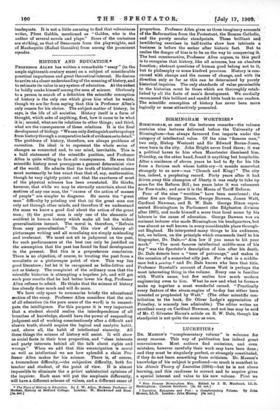BIRMINGHAM WORTHIES.*
BIRMINGHAM, as one of the lecturers remarks—the volume contains nine lectures delivered before the University of Birmingham—has always favoured free imports under the category of intellectual value. Of the nine "famous men," two only, Bishop Weatcott and Sir Edward Burne-Jones, were born in the city. John Bright never lived there; it was a political haven to him when Manchester dismissed him. Priestley, on the other hand, found it anything but hospitable. After a residence of eleven years be had to fly for his life from a furious mob whose battle-cry—it sounds somewhat strangely to us now—was "Church and King!" The city has, indeed, a perplexing record. Forty years after it had driven away this champion of liberty it was ready to take up arms for the Reform Bill ; ten years later it was vehement for Free-trade; and now it is the Mecca of Tariff Reform.
Four of the nine " worthies " have been mentioned ; the other five are George Dixon, George Dawson, James Watt, Cardinal Newman, and R. W. Dale. George Dixon repre- sented Birmingham in Parliament (the Edgbaston division after 1885), and made himself a more than local name by his labours in the cause of education. George Dawson was an eminent lecturer who made Birmingham his headquarters, but was almost as well known in every considerable place through- out England. He interpreted many things to his audiences; not, we believe, on the principle which commends itself to his biographer, Dr. Dale,—" Aim low if you mean to hit your mark." "The most famous intellectual middle-man of his day" was the Spectator's description of him after his death. Dr. Dale detects here a "tone of patronage," and makes it the occasion of a somewhat silly jest. For what is a middle- man but a 1.4sairrir ? and Dr. Dale knows who bore that title. Professor Burstall's account of James Watt is perhaps the most interesting thing in the volume. Every one is familiar with Watt's name, but few realise how much modern engineering owes to him. What he saw and what he foresaw make up together a most wonderful record. "Practically every feature of the steam-engine of to-day has either been invented or prophesied by Watt." (The other scientific con- tribution to the book, Sir Oliver Lodge's appreciation of Priestley, is scarcely less admirable.) The editor writes an excellent essay on Cardinal Newman, and not less may be said of Mr. C. Silvester Home's article on R. W. Dale, though his standpoint is not quite the same as ours.








































 Previous page
Previous page